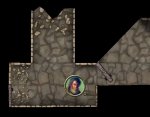Just a little question: how do you use the Investigation skill in your games? I've been using it as an analog of 3E Search, finding hidden traps and doors and such. Per the PHB, that's covered by Perception, but Perception is already a really good skill, and Investigation doesn't seem to do much. Thoughts?
In my game, the DM calls for an Intelligence (Investigation) check when a player describes his or her character as trying to deduce what a particular clue means and the DM finds that the attempt at deduction has an uncertain outcome.
 Red Creek Rufus, a beastmaster ranger, explores the ruins of a citadel once held by elves that venerated dragons.
Player:
Red Creek Rufus, a beastmaster ranger, explores the ruins of a citadel once held by elves that venerated dragons.
Player: Red Creek Rufus holds his torch firmly and enters the corridor.
DM: The air is stale in this 20-foot-long corridor, which leads to another closed stone door in front of which the ubiquitous rubble of this ruin has piled. A hallway leads north but stops short in ruin. An arrow, larger than one that a human would loose from a bow is lodged into the wall next to the door you opened. What do you do?
Player: I pull that arrow out of the wall and examine it.
DM: The arrow is old and splintered from its age and the impact. Its tip is stained black.
Player: Hmm, elves wouldn't use an arrow this large. This stain might be poison. I try to deduce from what or where this arrow might have come, drawing upon years in the wilds hunting with bow and arrow.
DM (figuring the outcome is uncertain): You're no slouch with a bow, that's for sure. Let's see a DC 10 Intelligence (Investigation) check.
Player: Okay. *rolls* 12.
DM: Given its downward angle when it was lodged in the wall, it appears to have been loosed from the ceiling of the far wall. What do you do?
Player: This sounds like a trap. I look around the immediate area for any tripwires, pressure plates, or wires, staying generally exactly where I'm standing to be safe for now.
DM (figuring the outcome is uncertain): Let's see a DC 15 Wisdom (Perception) check.
Player: *rolls* 15, on the money.
DM: There are variations in the mortar and stone of the floor in the middle portion of the corridor compared to the surrounding floor - you were right to expect pressure plates.
Player: Hmm. that's about a 10-foot-square area. I could jump if it I gave it a good run, but leaping into rubble might be tricky...


